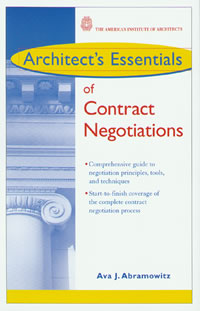
by Ava J. Abramowitz, Hon. AIA
 This
story is excerpted from Architect's Essentials of Contract Negotiation,
published in 2002 by John Wiley & Sons, Inc., and developed in partnership
with the AIA. It is reprinted here by permission.
This
story is excerpted from Architect's Essentials of Contract Negotiation,
published in 2002 by John Wiley & Sons, Inc., and developed in partnership
with the AIA. It is reprinted here by permission.
Negotiating can be fun for both you and the "other," a term I use to reference the other person with whom you are negotiating. This is true only if you use negotiation, not to align words on paper, but to align energies for project success. Project negotiation—whether the negotiation involves you with an owner, a contractor, a zoning official, or whomever—provides you the opportunity to focus with the other on what is necessary for project success. This is true even with respect to negotiating owner-drafted agreements. Contract negotiations provide you and the owner the last best chance to finalize expectations and to make sure that both of you will be working equally hard on the same project to the same end.
Now, you may be thinking, "That's easy for her to say. She's not an architect." That is quite true. I am a lawyer; furthermore, I was brought up learning how to negotiate. Most architects are not taught how to negotiate, in no small part because the National Architectural Accrediting Board and the National Council of Architecture Registration Boards historically have not required negotiation to be taught. But the need is there.
 This
first came home to me when I was deputy general counsel at the American
Institute of Architects (AIA). At that time, I would often walk to work
with a colleague, Jim Franklin (now FAIA), who lived around the corner.
One morning I told him the story of my niece, Beatrice, who was seven
at the time. She had called the night before, crying uncontrollably and
beyond consolation. Her mother had refused her request to hold an overnight
at her house. Now this was a real loss to her.
This
first came home to me when I was deputy general counsel at the American
Institute of Architects (AIA). At that time, I would often walk to work
with a colleague, Jim Franklin (now FAIA), who lived around the corner.
One morning I told him the story of my niece, Beatrice, who was seven
at the time. She had called the night before, crying uncontrollably and
beyond consolation. Her mother had refused her request to hold an overnight
at her house. Now this was a real loss to her.
Since Beatrice at that time was afraid to leave her mother, she never went on overnights, and not being allowed to have an overnight in her own home meant that she could not be part of her peer group. She just could not stop crying. Finally, I said to her, Beatrice, stop crying immediately. One, I don't have the power to reverse your mother, so all your tears are in vain. And, two, you are crying prematurely. You have no idea why your mother said no. Maybe she didn't want it that Saturday night; maybe she didn't want 10 girls; maybe she only wanted 5 girls. You have no basis for crying, none whatsoever. Now, go wash your face, brush your hair, go back to your mother, and—not accusingly whatsoever—simply ask, "Mama, about that overnight: Why didn't you want it?" Find out what your mother's concerns are, give me a call, and we'll figure out a negotiating strategy." Five minutes later the phone rang again. "It's in two weeks, on a Saturday night, six girls plus me."
Jim was somewhat horrified and very jealous. He said to me, "This is unfair. No one ever taught me how to negotiate!" And I looked at him and said, "How do you go through life not knowing how to negotiate?" Right then and there I silently promised myself that someday I would write this book.
Book Chapter Titles
1. Why You Want to Read This Book
2. Front-End Alignment
3. The Purpose of Contracts
4. Power and Leverage: How to Get It and Keep It
5. Preparation Tips
6. Power and Leverage Redux: The Skills of Expert Negotiators
7. How to Say Yes, How to Say No
8. When the Best Laid Plans…
9. Pulling It All together
Appendix: Building a Support System
Copyright 2002 The American Institute of Architects. All rights reserved.
![]()
| You can
order Ava Abramowitz's Contract
Negotiation, part of the The Architect's Essentials of Professional
Practice Series, from the AIA Bookstore. Each book is $32 AIA members/$35
retail (plus $6 shipping per order). |
|